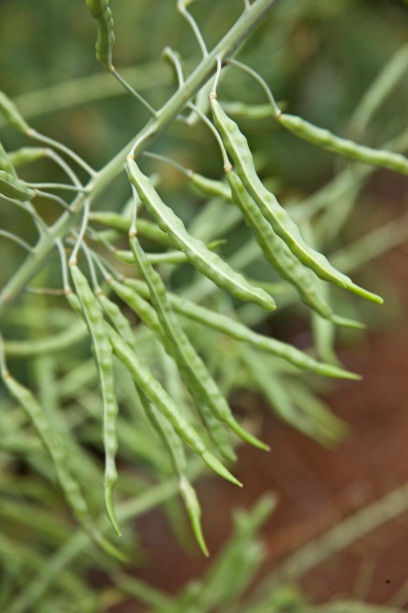
Cabbage seed pod
One of the many inconveniences this cruel war has inflicted upon the citizens of Virginia is the scarcity of kitchen garden seeds.
Before the year 1775, all the stores in town were well stocked with a wide assortment of seed of all the newest varieties, but as all these seeds came to us from Europe and we, in our complacency, had founded no industry to supply them for ourselves, we now must raise seed from our own garden plants or have no seed at all.
As too few gardeners have perfected the art I will offer a few general principles.
Some types of seed, such as Leek and Parsnip, are very short lived and must be raised annually. Others, such as Melons, are very long lived and many believe are not fit to plant until they have been well aged.
James Justice has given us these instructions for melon seeds in The British Gardener’s New Director: “Seed of two or three years old, which has been well kept, is much better than that of the preceding year, and should the seed be soft, keep it in your breeches-pocket for a month or six weeks; by which the superabundant moisture will be better carried off, than in any other way.”
Many vegetables will produce seed the same season they are sown while others, such as Cabbages and Salsify, are biennials and must pass through a winter season to flower and seed.
Lettuce flowers
Some plants, such as Beans and Lettuce have perfect flowers containing both male and female components. Others such as squash and melons have imperfect flowers which are either male or female and require the farina of the male flower to be carried to the stigma of the female.
Salsify seedhead
Beans and Lettuce are self-fertile and reliably produce like offspring while melons, squash and carrots, which are not isolated one from the other, will give rise to many sports or varieties that may be quite different from the parent plant.
This variability has now become a marketing ploy for unscrupulous nurserymen and was remarked upon by Richard Bradley in New improvements of planting and gardening: “I have often wonder’d at the Indiscretion of some People, who take delight in giving cramp Names to Plants, and make it their business to multiply Species without reason; as if a Fruit would be the better for Name.”
There are, of course, many other considerations such as how to process, clean and store your seed but it is hoped these generalities will foster an interest in locally produced seed which may promote the American industry and free us from our dependence on English seed houses.

Leave a Reply